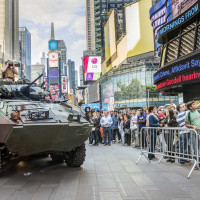Coercive World State of Power 2021
Topics
TNI's tenth State of Power report explores the history, structures and changing dynamics of the military, policing and homeland security in the world today and outlines emancipatory visions and ideas to end the violence of the state.
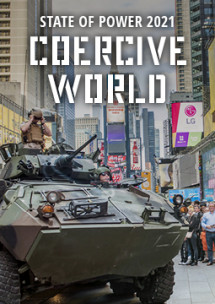
Downloads
Webinar
Speakers:
- Arun Kundnani, writer on race, culture and empire and author of "The Muslims are Coming" (Verso 2014)
- Olufemi Taiwo, Assistant Professor of Philosophy at Georgetown University
- Nikita Sovanane and Srujana Bej, Criminal Justice and Police Accountability Project (CPAProject), Bhopal, India
- Nora Miralles and Felipe Daza, Observatory on Corporations and Human Rights in the Mediterranean (ODHE)
Hosted by Niamh ni Bhriain and Nick Buxton. The webinar explored the reasons for the hegemonic rise of militarised and security-based responses by states and outline visions, ideas and strategies for confronting and ending repressive state power.
Infographics
View all the infographics here: https://longreads.tni.org/state-of-power-2021
Podcast
Episode 25 of State of Power podcast - Becoming Black: Coercive power, the state and racism in a time of crisis (In conversation with Olúfémi Táíwò and Achille Mbembe)
Host Shaun Matsheza and guest host Nick Buxton, in conversation with Olufemi Taiwo and Achille Mbembe discuss the history, trajectory, current state and likely future of coercive state power.
Essays
Becoming Black: Coercive power, the state and racism in a time of crisis
Conversation between Olufemi Taiwo and Achille Mbembe
Written edited transcript of podcast above in which two leading Black scholars help explain the rise of state violence in recent years, the ways security narratives are becoming ever more hegemonic, the roots of coercion in colonialism, the likely impacts of the climate crisis and digitalisation, and the ways social movements can best resist and advance alternative visions of emancipation and justice. Read online | Download as PDF
No business without enemies: War and the arms trade
Jordi Calvo Rufanges
The arms trade is one of the world’s most successful corporate enterprises. Not only has it created an economic system that grows regardless, it has normalised war and security responses to every social crisis. Read online | Download as PDF
Blurring the monopoly on violence: Private Military and Security Companies and coercive state power
Carlos Díaz, Ekaterina Zepnova, Felip Daza, Giulia Campisi and Nora Miralles. Observatorio de Derechos Humanos y Empresas del Mediterráneo (ODHE)
The state’s role in security has been progressively privatised, from the military to the prison system. The result is a shadowy corporate world in which violence is facilitated, accountability is diminished and human rights violations and impunity abounds. Read online | Download as PDF
From Xinjiang to Mississippi: Terror capitalism, labour and surveillance
Darren Byler
The Chinese state within Xinjiang has forged a form of capitalist frontier-making based on data harvesting and unfree human labour that exploits ethno-racial difference in order to generate new forms of capital accumulation and coercive state power. Read online | Download as PDF
The 9/11 complex: The political economy of counter-terrorism
Azfar Shafi
‘Counter-terrorism’ is a set of policies, an ideology, a political project and, increasingly, an industry. Understanding and confronting the underlying political economy of counter-terrorism will be critical to any strategies to address police, state violence and the security industry. Read online | Download as PDF
The macho state: coercion, patriarchy and resistance
Diana Quiroz
When police officers themselves are responsible for so many cases of gender-based violence and when so many cases are never addressed by the judicial system, what does that say about both the institution of the police, the state and their coercive apparatus? Read online | Download as PDF
Neoextractivism and state violence: Defending indigenous rights in Latin America
Aldo Orellana López
The commodities boom in the early 2000s extended the frontiers of extractivism and have relied on state violence, making Latin America one of the most dangerous and deadly places for indigenous peoples and frontline community defenders. Focused on Peru and Colombia, this essay explores dynamics of state violence and strategies for effective resistance. Read online | Download as PDF
Dismantling the Imperial Boomerang: A Reckoning with Globalised Police Power
Joshua M. Makalintal
President Duterte’s ordered killings and wanton use of police violence can not be understood without understanding the ways US imperialism shaped the Philippines, which in turn shaped US and ultimately global policing. Empire’s boomerang cannot be demolished only within the US or Philippines, but instead demands a stark transnational response of reimagining and transforming the coercive powers of the state. Read online | Download as PDF
Settled Habits, New Tricks: Casteist Policing Meets Big Tech in India
Ameya Bokil, Avaneendra Khare, Nikita Sonavane, Srujana Bej and Vaishali Janarthanan
Big Tech is reinforcing and accelerating a system of caste-based discrimination in India and reinforcing the power and impunity of its police. Read online | Download as PDF
Israel: the model coercive state - and why boycotting it is key to emancipation everywhere
Alys Samson Estapé
Israel’s arms and security industry has become an intrinsic part of the apartheid regime. It is not only present in the brutal violence of the bombing of Gaza and the constant harassment and dispossession of Palestinians, it is also shaping the coercive dimensions of states everywhere, bringing the politics and methodology of occupation to other countries and regimes. Read online | Download as PDF
Abolish National Security
Arun Kundnani
Like its criminal-legal system, the US’s global national security infrastructure spreads rather than reduces violence, in ways that are often organised through racism. Extending a politics of abolitionism to national security allows us to understand the structural drivers of endless war and border militarisation, and articulate new visions of security based on the presence of collective well-being rather than the elimination of ‘threats’. Read online | Download as PDF
Recommended reading
Militarism and the police: How our streets became battlefields
Andrew Metheven
Militarism is the glue that underpins violence being meted out to people around the world at the hands of the police and security forces. It will continue to sustain the violent, abusive, racist, oppressive policing that looks to uphold an oppressive and destructive status quo. It affects every one of us, so it is everyone’s concern.
Waging Counterinsurgency: How to dismantle the US coercive apparatus
Nicholas Guarnaccia
The constant waging of counterinsurgency by the US both domestically and on foreign soil has served as the basis of exchange among the institutions of the US and, eventually, the global coercive apparatus.
Expression Meets Repression: Social movements and police violence in Chile
Antonia Hinojoza Del Campo, Constanza Maluenda Castañeda, Daniela Ortega San Martín, Danny Rayman Labrin, Dinka Benítez Piraino, Macarena Martínez Abarca, Natalia Vallejos Gutiérrez
Chile's national police, the Carabineros, have a long and bloody track record of silencing groups demanding their labour, social and economic rights. Their continued existence and violence shows how the Carabineros serve as a key institution for maintaining social structures that perpetuate social injustices that benefit the elite.
Conflict and Development in Northeast India: Stories from Assam
Binita Kakati
Neo-capitalist development in the form of resource extraction in the North Eastern region of India has created a complex field for the contestation of identities, land sovereignty, and conflict.
Artwork and design
Photos by NOOR.
The web design and infographics were done by Evan Clayburg and researched by https://tippingpointnorthsouth.org/
Essays
-
No business without enemies War and the arms trade
Publication date:
-
Blurring the monopoly on violence Private Military and Security Companies and coercive state power
Publication date:
-
From Xinjiang to Mississippi Terror Capitalism, Labour and Surveillance
Publication date: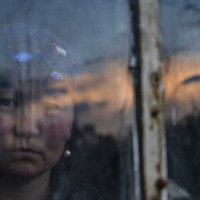
-
The 9/11 complex The political economy of counter-terrorism
Publication date: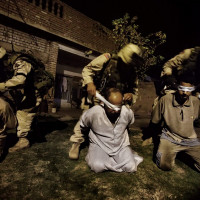
-
The macho state Coercion, patriarchy and resistance
Publication date:
-
Neoextractivism and state violence Defending the defenders in Latin America
Publication date: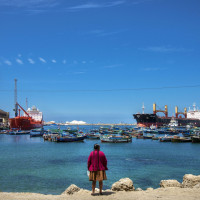
-
Dismantling the Imperial Boomerang A Reckoning with Globalised Police Power
Publication date:
-
Settled Habits, New Tricks Casteist Policing Meets Big Tech in India
Publication date: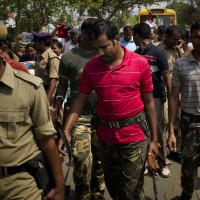
-
Israel: the model coercive state And why boycotting it is key to emancipation everywhere
Publication date:
-
Abolish national security
Publication date: